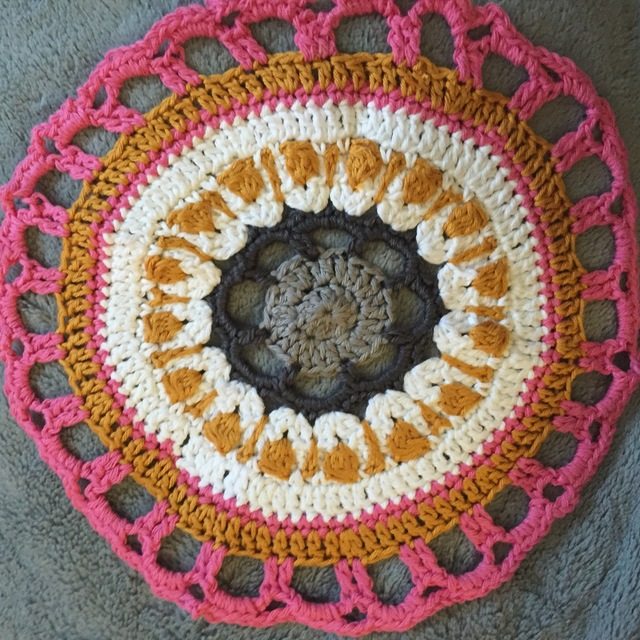The beautiful crochet mandala that you see here in today’s post for the Mandalas for Marinke project comes to us from Felicia Jones, “just a regular woman who loves crochet, cats, reading and movies”.
Felicia writes,
“Thank you for undertaking this project and making something beautiful out of something so tragic. I was not familiar with Marinke until I read your post, but I was still deeply saddened by her suicide. I visited her blog and admired her creativity and colorful work. I am so sad for Marinke’s family and friends – for their loss.”
She adds,
“Depression is a terrible thing. As The Bloggess says, “depression lies”. I hope that this project brings some comfort to Marinke’s loved ones, especially in knowing how she touched so many lives.
Crochet has helped me survive depression. Marinke’s patterns will live on to help and inspire others.”
Thank you so much to Felicia and each one of you that participated in this project; without the contributions, this project couldn’t exist. You can see all Mandalas for Marinke posts here.
Each of these posts has a depression awareness component and today’s comes from perhaps an unlikely source but one that I think is so important, which is Rachel Moran’s book Paid For: My Journey Through Prostitution. I’ve just finished reading this book, which is more than just her memoir about being a teen prostitute in Ireland, but is also a smart, incisive, researched look at the global issue of prostitution and what it means for women (and all people) around the world. I have to be honest in saying that just in the short span of reading this book, many of my own assumptions, beliefs and misconceptions have been challenged and my own thinking has changed radically in small ways.
Chapter 23 in this book is about depression and suicide as it relates to the life of women who have been prostituted. She describes how she experienced depression as a child, long before being prostituted, and how she experienced long after as well in large part due to the repercussions of that life. She writes, in part, about the shock she experienced upon reading the DSM description for diagnosing depressive disorders,
“I was shocked to read the list of symptoms. I was shocked because, during my last episode of depression (which was post-prostitution) I experienced and exhibited every last one. Had I been asked, I would have said that I was depressed, but had I been asked to quantify that on the scale used to measure this illness (mild, moderate to severe), I would have never thought to say that it was severe. I would have thought that it was moderate, middle-of-the-road depression. That is frightening to me. It is frightening to realise that I vastly underrated the depths of my own despair and it is saddening to see why: i had felt so bad for so long that I had come to normalise those feelings.”
I think this section stood out to me in particular because it resonated so deeply with my own experience of depression. Moran goes on to describe being chronically indecisive and experiencing other specific symptoms of depression in a way that exactly mirrors much of what I experienced. My life was nowhere near the tragedy I perceive a life in teenage prostitution to be, and yet our experience of depression can be described in similar ways.
This is not to suggest by any stretch that all depression is the same or that my own experience of life was the same as hers. It’s to show the depression cuts across all class lines and cultures; and that at the same time it is definitely an expression of an underlying global mental health crisis that facilitates and simultaneously is exacerbated by all other social ills from addiction to poverty.





1 comment
Comments are closed.